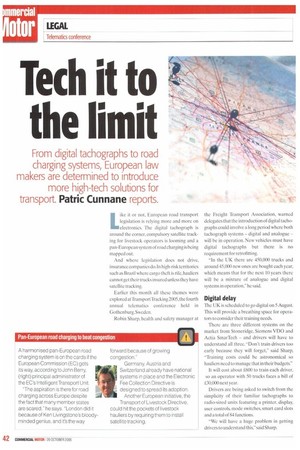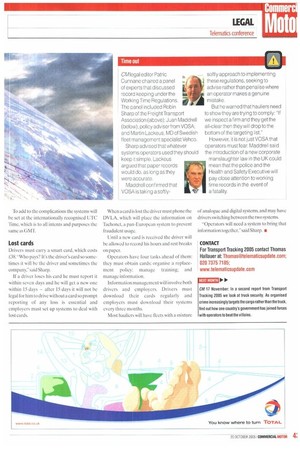Tech it to the limit
Page 42

Page 43

If you've noticed an error in this article please click here to report it so we can fix it.
From digital tachographs to road charging systems, European law makers are determined to introduce more high-tech solutions for
transport. Patric Cunnane reports.
Like it or not, European road transport legislation is relying more and more on electronics. The digital tachograph is around the corner, compulsory satellite tracking for livestock operators is looming and a pan-European system of road charging is being mapped out.
And where legislation does not drive, insurance companies do. In high-risk territories such as Brazil where cargo theft is rife, hauliers cannot get their trucks insured unless they have satellite tracking.
Earlier this month all these themes were explored atTransport Tracking 2005, the fourth annual telematics conference held in Gothenburg, Sweden.
Robin Sharp, health and safety manager at the Freight Transport Association, warned delegates that the introduction of digital tachographs could involve a long period where both tachograph systems digital and analogue will be in operation. New vehicles must have digital tachographs but there is no requirement for retrofitting.
"In the UK there are 450,000 trucks and around 45,000 new ones are bought each year, which means that for the next 10 years there will be a mixture of analogue and digital systems in operation," he said.
Digital delay
The UK is scheduled to go digital on 5 August. This will provide a breathing space for operators to consider their training needs.
There are three different systems on the market from Stoneridge, Siemens VDO and Actia SmarTech and drivers will have to understand all three. "Don't train drivers too early because they will forget," said Sharp, "Training costs could be astronomical so hauliers need to manage that in their budgets.
It will cost about £600 to train each driver, so an operator with 50 trucks faces a bill of £30,000 next year.
Drivers are being asked to switch from the simplicity of their familiar tachographs to radio-sized units featuring a printer, display, user controls, mode switches, smart card slots and a total of 84 functions.
"We will have a huge problem in getting drivers to understand this," said Sharp. To add to the complications the systems will be set at the internationally recognised UTC Time, which is to all intents and purposes the same as GMT.
Lost cards
Drivers must carry a smart card, which costs 08. "Who pays? It's the driver's card so sometimes it will be the driver and sometimes the company,said Sharp.
If a driver loses his card he must report it within seven days and he will get a new one within 15 days — after 15 days it will not be legal for him to drive without a card so prompt reporting of any loss is essential and employers must set up systems to deal with lost cards. When a card is lost the driver must phone the DVLA, which will place the information on Tachonet, a pan-European system to prevent fraudulent usage.
Until a new card is received the driver will be allowed to record his hours and rest breaks on paper.
Operators have four tasks ahead of them: they must obtain cards: organise a replacement policy: manage training; and manage information.
Information management will involve both drivers and employers. Drivers must download their cards regularly and employers must download their systems every three months.
Most hauliers will have fleets with a mixture of analogue and digital systems, and may have drivers switching between the two systems. "Operators will need a system to bring that information together," said Sharp, •










































































































































































































